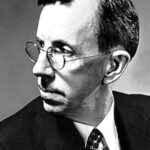Louis de Broglie (15 August 1892 – 19 March 1987) was a French physicist. He was awarded the Nobel Prize in Physics in 1929 for his contribution to the development of wave mechanics.
Life and Career
He was born on 15 August 1892, in Dieppe, France. He initially studied history and literature, but his interests soon turned to science. He entered the École Normale Supérieure in Paris in 1913, where he studied physics and mathematics.
He earned his Ph.D. in 1924 from the same institution, with a thesis titled “Researches on the Theory of the Quanta,” which laid the foundation for his theory of matter waves. He was influenced by the work of Albert Einstein and Max Planck, among others. He also collaborated with other prominent physicists of the time, such as Niels Bohr and Erwin Schrödinger.
In 1924, de Broglie proposed that all matter, including electrons, photons, and atoms, has both wave-like and particle-like properties. He suggested that particles have a wavelength associated with them, which is related to their momentum. This concept was based on the idea that if light, which was already known to have wave-like properties, could also exhibit particle-like behavior (as demonstrated by the photoelectric effect), then perhaps particles could also have wave-like properties.
His theory of wave-particle duality was confirmed by experiments, including the famous double-slit experiment, which demonstrated that electrons could behave like waves and interfere with each other, creating an interference pattern.
His work laid the foundation for the development of quantum mechanics, which revolutionized our understanding of the behavior of matter and energy at the atomic and subatomic levels. He also made other important contributions to physics, including work on the theory of relativity and the concept of wave-particle duality. He was a member of the French Academy of Sciences. He died on 19 March 1987, in Louveciennes, France.
Award and Legacy
He was awarded the Nobel Prize in Physics in 1929 for his contributions to the understanding of wave-particle duality and for advancing the field of quantum mechanics.
Observer Voice is the one stop site for National, International news, Editor’s Choice, Art/culture contents, Quotes and much more. We also cover historical contents. Historical contents includes World History, Indian History, and what happened today. The website also covers Entertainment across the India and World.










